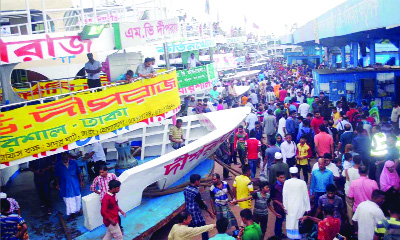
BSS, Rajshahi :
Rasheda Begum, 24, a pregnant mother of Khordagovindapur village under Charghat Upazila in the district, is very happy over getting her necessary antenatal care from a nearby community clinic.
As her husband remains busy for his almost daylong professional works she goes to the clinic with her own initiative. She terms the Khordagovindapur Community Clinic (CC) as vital means for regular medical checkup. After getting her doorstep services she’s mentally satisfied.
Ashraful Islam Sarker, 28, an NGO worker, became fainted due to hardworking amid extreme sultry weather around two weeks back. He was immediately rushed to Jhikra CC under the same upazila and become fit after getting necessary healthcare services there.
Not only Rasheda Begum and Ashraful Islam, many others including Rubina Khatun, 26, of Berabari, Asir Uddin, 35, of Batupara and Nazrul Islam, 40, of Bakshimoil villages under Mohanpur Upazila received emergency primary healthcare services from their respective CCs expressing their gratitude to those.
Hasanuzzaman Madhu, Chairman of Sardaha Union Parishad under Charghat Upazila, said many of his area are getting physicians advice, health services and necessary medicines from the clinics without hassle and paying higher prices.
He also sought more fund and medicine for the community clinics those are providing basic, but important health services to the rural people who were earlier out of the support of institutional health services.
The existing CCs have attained trusts of grassroots people including poor and merginalised as they are getting requisite primary healthcare services regularly at their doorsteps in the region, added the public representative.
Dr Abdus Sobhan, Divisional Director of Health, here told BSS that there are 1952 CCs in eight districts under the division. Of those, 1947 are functional provided services to 1,67,41,355 people including 24,91,633 newborns and babies and referred 24,30,506 others to better hospitals last year.
Antenatal services were provided to 1,38,768 pregnant mothers postnatal services to 80,331 others.
A total of six employees, including community health provider, health assistant and family planning worker are working at the clinic, he said, adding that the government are giving patients 28 different medicines at free of cost.
“We mainly provide five health services to people. These are: family planning, EPI, nutrition, primary healthcare and health education,” Dr Sobhan added.
“People are getting health education, referral advice, pregnancy checkup and de-warming and vaccination at the clinics that brought healthcare services to their doorsteps,” said Rajshahi Civil Surgeon Dr. Samjit Kumar Shaha.
In addition to the healthcare services, the CCs are providing various family planning services including cost free distribution of coontraceptive materials. People are also getting referrals services for ubectomy and vasectomy.
Dr. Samjit Shaha mentioned that the CCs are being made capable for normal delivery through imparting training to the family welfare assistances and visitors besides supplying necessary instruments.
Rasheda Begum, 24, a pregnant mother of Khordagovindapur village under Charghat Upazila in the district, is very happy over getting her necessary antenatal care from a nearby community clinic.
As her husband remains busy for his almost daylong professional works she goes to the clinic with her own initiative. She terms the Khordagovindapur Community Clinic (CC) as vital means for regular medical checkup. After getting her doorstep services she’s mentally satisfied.
Ashraful Islam Sarker, 28, an NGO worker, became fainted due to hardworking amid extreme sultry weather around two weeks back. He was immediately rushed to Jhikra CC under the same upazila and become fit after getting necessary healthcare services there.
Not only Rasheda Begum and Ashraful Islam, many others including Rubina Khatun, 26, of Berabari, Asir Uddin, 35, of Batupara and Nazrul Islam, 40, of Bakshimoil villages under Mohanpur Upazila received emergency primary healthcare services from their respective CCs expressing their gratitude to those.
Hasanuzzaman Madhu, Chairman of Sardaha Union Parishad under Charghat Upazila, said many of his area are getting physicians advice, health services and necessary medicines from the clinics without hassle and paying higher prices.
He also sought more fund and medicine for the community clinics those are providing basic, but important health services to the rural people who were earlier out of the support of institutional health services.
The existing CCs have attained trusts of grassroots people including poor and merginalised as they are getting requisite primary healthcare services regularly at their doorsteps in the region, added the public representative.
Dr Abdus Sobhan, Divisional Director of Health, here told BSS that there are 1952 CCs in eight districts under the division. Of those, 1947 are functional provided services to 1,67,41,355 people including 24,91,633 newborns and babies and referred 24,30,506 others to better hospitals last year.
Antenatal services were provided to 1,38,768 pregnant mothers postnatal services to 80,331 others.
A total of six employees, including community health provider, health assistant and family planning worker are working at the clinic, he said, adding that the government are giving patients 28 different medicines at free of cost.
“We mainly provide five health services to people. These are: family planning, EPI, nutrition, primary healthcare and health education,” Dr Sobhan added.
“People are getting health education, referral advice, pregnancy checkup and de-warming and vaccination at the clinics that brought healthcare services to their doorsteps,” said Rajshahi Civil Surgeon Dr. Samjit Kumar Shaha.
In addition to the healthcare services, the CCs are providing various family planning services including cost free distribution of coontraceptive materials. People are also getting referrals services for ubectomy and vasectomy.
Dr. Samjit Shaha mentioned that the CCs are being made capable for normal delivery through imparting training to the family welfare assistances and visitors besides supplying necessary instruments.

